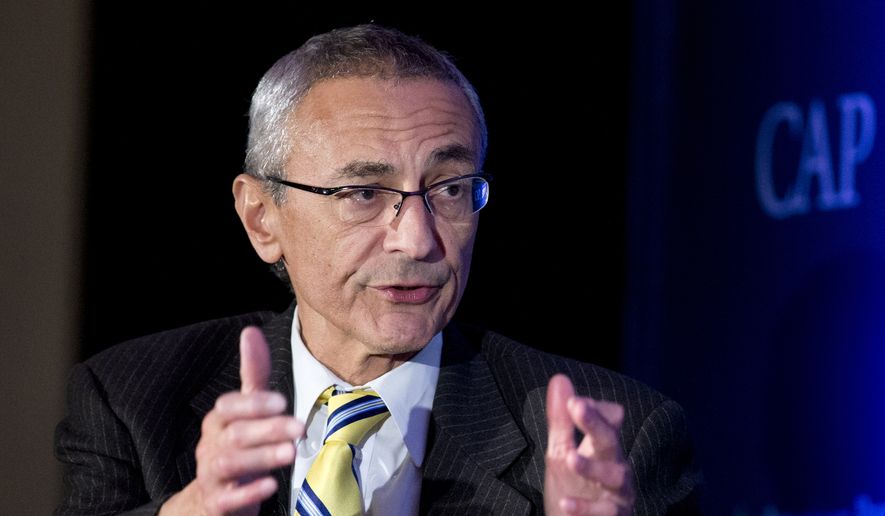The Hillary Clinton campaign and its allies, rallying behind the contention that cyberwarfare played a role in swinging the presidential election for Donald Trump, are now taking parting shots at the Obama administration, the intelligence community and the media for failing to treat the Russian hacking threat with sufficient urgency.
Many Clinton confidants place blame for the Electoral College defeat squarely at the feet of FBI Director James B. Comey, arguing that his letter to Congress 11 days before the election reopening the investigation into Mrs. Clinton’s private email server turned the tide decisively in favor of Mr. Trump.
But Clinton campaign chairman John Podesta said Sunday that the FBI is also culpable for negligence in response to suspected Russian meddling in the democratic process.
Mr. Podesta said the agency did not contact him about the hack into his personal email account until after WikiLeaks began publishing his emails by the thousands on Oct. 7.
“Two days later, the FBI contacted me, and first thing the agent said to me was, ’I don’t know if you’re aware, but your email account might have been hacked,’” Mr. Podesta said on NBC’s “Meet the Press.” “I said, ’Yes, I was aware of that.’”
“That was the first and last time I talked to the FBI,” he said.
Attorney General Loretta E. Lynch dismissed Mr. Podesta’s accusation that the agency delayed a response to the cyberattacks. She said he wasn’t privy to agency decision-making on the matter.
“I can’t comment on Mr. Podesta’s sources or where he gets that information or why he has that view,” Ms. Lynch said in an interview broadcast Sunday on CNN’s “State of the Union.” “But what I can say is that he’s not involved in the ongoing investigation, so he wouldn’t be privy to everything that would have been done or said to that. But, as I said, he’s entitled to his opinion.”
She said the investigation is “not even over, so it’s impossible to characterize it in any one way or the other.”
Democratic National Committee interim Chairwoman Donna Brazile undermined President Obama’s claim that hacking attempts against top party officials ceased after he told Russian President Vladimir Putin to “cut it out” at a conference in September.
“No, they did not stop,” Ms. Brazile said Sunday on ABC’s “This Week.” “They came after us absolutely every day until the end of the election. They tried to hack into our system repeatedly. We put up the very best cybersecurity — what I call infrastructure — to stop them, but they constantly, they came after us.”
Despite claiming credit for halting the cyberattacks, Mr. Obama said he took a cautious approach toward Russia’s suspected interference in the democratic process so as not to discredit the legitimacy of the election.
“I wanted to make sure we were playing this thing straight,” the president said at his end-of-the-year press conference, responding to criticism that his administration did not do more to thwart the hacking.
When asked whether she was disappointed in the president’s timid response, Ms. Brazile said she was “disappointed we went through this process.”
Mr. Podesta was less reserved.
“Do I, in retrospect, wish they had done more?” Mr. Podesta said of the White House. “Sure, of course I do.”
Mike Rogers, a former Republican congressman who chaired the House Permanent Select Committee on Intelligence, said the president’s response to the suspected cyberattacks was typical for an administration unwilling to hold Russia accountable.
“When you look at what happened in the last eight years, we really walked away from Ukraine, we walked away from the troop increase by Russians in this country of Georgia, we did this convoluted chemical deal that really alienated our allies in the Middle East with Russia, and it strengthened their ties with Iran,” Mr. Rogers said on CNN’s “State of the Union.” “All of that, pretty bad stuff.”
“For the president to make a phone call and say, ’Well, cut that out,’ tells you how far we are behind in solid peace-through-strength diplomacy,” he said.
Although he acknowledged the Clinton campaign bears some responsibility for the outcome on Election Day, not even the media were free from Mr. Podesta’s exercise in fault-finding.
“I’m not saying that it’s everybody else’s fault — we bear responsibility for the outcome as well, I know that,” he said. “But The media did not cover itself with glory in the way that they handled, I think, the matter. The New York Times reported this week in their own reporting that they became an instrument for Russian intelligence.”
Asked whether the election was “free and fair,” Mr. Podesta demurred.
“I think it was distorted by the Russian intervention. Let’s put it that way.”
• Bradford Richardson can be reached at brichardson@washingtontimes.com.




Please read our comment policy before commenting.